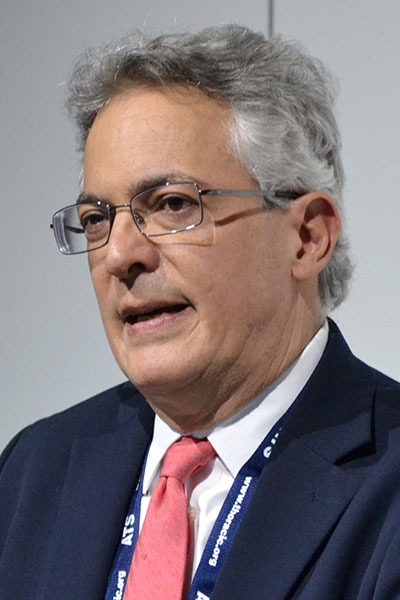
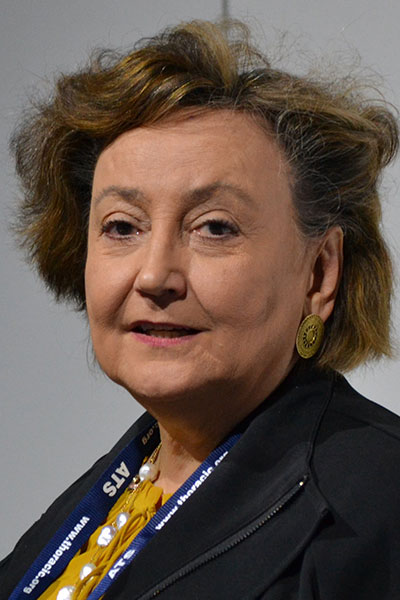
The Respiratory Societies of the Americas session debuted at the ATS 2023 International Conference, featuring representatives from four societies discussing COPD: The Challenges of Access to Medicines and the Impact of Public and Private Health Policies in the Americas.
“COPD affects a great number of people in our countries, and the regulatory and approval processes are diverse and can be complicated,” said session moderator Margareth Pretti Dalcolmo, MD, PhD, National School of Public Health, Oswaldo Cruz Foundation, Brazil. “This is a very relevant subject for us to address.”
Dr. Dalcolmo shared moderation with ATS Past President Juan Carlos Celedón, MD, DrPH, the Niels K. Jerne Professor of Pediatrics and professor of medicine, epidemiology, and human genetics at the University of Pittsburgh, and the division chief of pulmonary medicine at the UPMC Children’s Hospital of Pittsburgh.
United States
Francesca Polverino, MD, PhD, professor at Baylor College of Medicine, represented the ATS and gave an overview of COPD prevalence and care in the U.S., showing that less than half of the patients diagnosed with asthma and COPD take their medication as prescribed.

“Out-of-pocket spending, particularly for drugs, is a substantial burden for patients with COPD,” Dr. Polverino said.
Research shows that, compared to non-Hispanic white patients, African Americans are less likely to have a primary care physician and are more likely to go to the emergency department for COPD symptoms, she explained. Ultimately, cumulative differences in access may contribute to greater COPD severity in African Americans.
The U.S. is the only industrialized country without universal access to health care, and health insurance is a business. Dr. Polverino cited a 2005 study that said while physicians have a professional and ethical obligation to their patients, health insurers’ primary legal obligation was to their shareholders.
She cautioned that although the U.S. passed the Affordable Care Act in 2010, affordability remains relative.
“Affordable does not always mean adequate,” she said. “Even with insurance, there is a high cost for care, and many patients are unable to afford medications, which might not be covered. This is often the case for patients with COPD.”
Latin America
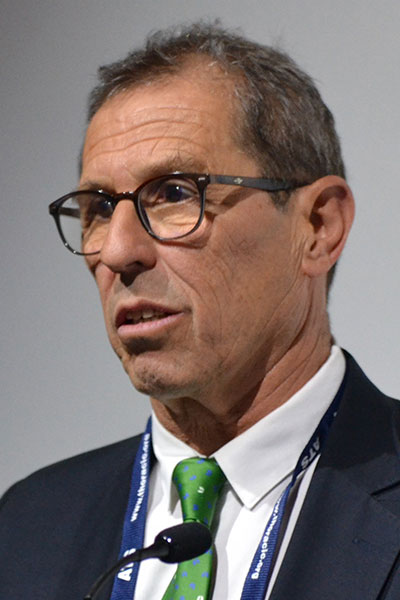
Gustavo Enrique Zabert, MD, associate professor and director of the pneumology training program, Faculty of Medical Science at the National University of Comahue, Argentina, represented the Latin American Thoracic Society.
In Latin America, COPD is prevalent and often underdiagnosed, he said. It requires an integrated approach, one in which prevention is the priority, through strong policies against tobacco smoking and indoor air pollution.
The emphasis on COPD should be at the primary care level, and better access to effective medications is key, Dr. Zabert said. A 2015 study he cited showed less than 10 percent of people who had previously been diagnosed with COPD in the primary care setting received long-acting bronchodilators. None of the people in the study without insurance received this therapy.
“There is low clinical suspicion of COPD and an underuse of spirometry in COPD,” he said. “And many primary care providers in Latin America do not agree with the effectiveness of the treatment for COPD.”
Brazil
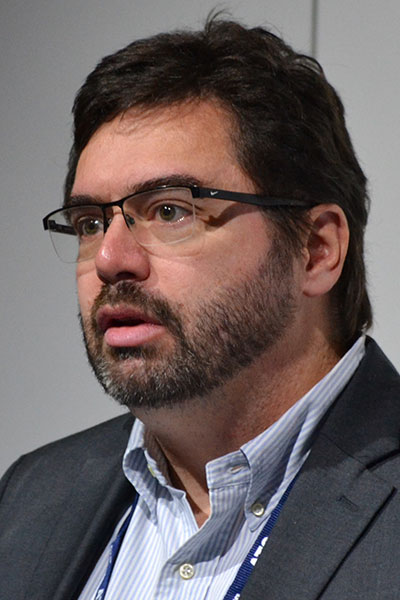
Frederico Fernandes, MD, PhD, a physician at the Pulmonary Function and Ergospirometry Service of the Instituto do Coração do Hospital das Clínicas at the Universidade de São Paulo Medical School, São Paulo, Brazil, represented the Brazilian Thoracic Society.
Dr. Fernandes’ research collected data from death certificates in Brazil from 2000 to 2019.
“We found that, from all the death certificates, COPD was present in 6 percent of all of them — children to elderly — as associated or as an underlying condition,” he reported. Through the study, he also found that COPD mortality differs across regions in Brazil, with the northern areas, which are underdeveloped, showing more deaths from the disease.
“This shows that there are not only problems accessing medications, but also social and regional inequity,” Dr. Fernandes said.
A striking gap between the rich and the poor makes Brazil’s universal health care incredibly important, he continued. In 2003, Dr. Fernandes launched a study on the use of long-acting muscarinic antagonists to treat COPD, and in the process, he had to navigate the multiple spheres of payment in the Brazilian health system.
“What we learned in our interaction with the health secretary in São Paulo is that there is, by default, a disconnection between lawmakers and health care providers,” Dr. Fernandes said.
The bureaucracy that comes with universal health care made that lack of connection even more pronounced, and one of his conclusions was that partnership with state public health managers is essential to effective research and patient care.
It has worked in many ways; for example, 20 states in Brazil provide COPD medication to their residents.
“It’s progress, but we still have many hurdles,” Dr. Fernandes said.
Canada
Mohit Bhutani, MD, FRCPC, FCCP, professor of pulmonary medicine and director of the asthma and COPD clinics, University of Alberta, Canada, represented the Canadian Thoracic Society and is president of the organization.
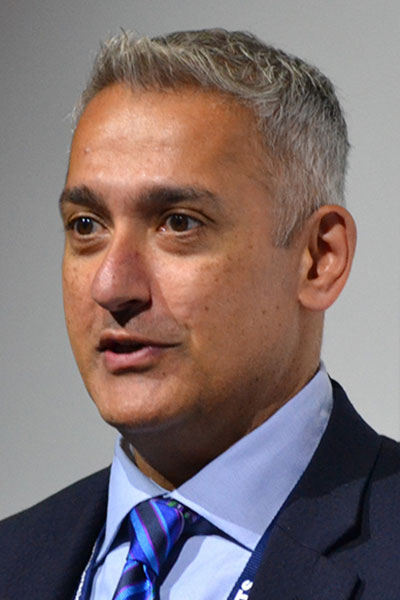
The Canadian health care system is federally regulated but provincially administered. It’s something Canadians are proud of, said Dr. Bhutani, but it has limitations. The biggest example is that Canada is the only country with universal health care that does not have universal pharmaceutical care. Private insurance is available for drug coverage, but it is unaffordable for many.
“There is no requirement for provinces or territories to provide outpatient medication coverage,” he said. “In 2021, 21 percent of Canadians — that’s 7.5 million people — do not have coverage for prescription medications.”
That affordability problem is even worse for immigrants and indigenous people, whose populations lack drug coverage at an even higher percentage, he said.
Canada began taking a serious look at a national program for pharma coverage in 2019, and then COVID-19 hit and stalled progress. But the government has reignited the effort.
“In this year’s federal budget, there is a commitment to pass the Canada Pharmacare Act by 2023,” Dr. Bhutani concluded.
Don’t Miss ATS 2024 Highlights: On Demand
Don’t forget that ATS 2024 Highlights: On Demand are available to all conference registrants! On Demand will give you access to the Opening Ceremony, Plenary Session, Keynote Series, Clinical Year in Review, Adult Clinical Core Curriculum, and so much more. The topics will cover ILD, asthma, health equity, and CF, to name just a few. On Demand content will be accessible to all ATS 2024 full conference and On Demand registrants until March 2025.
